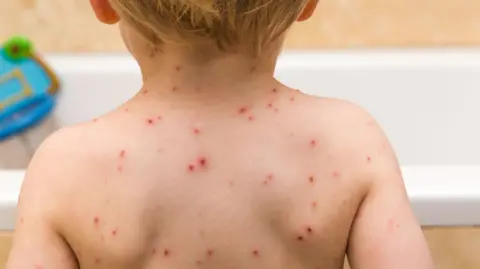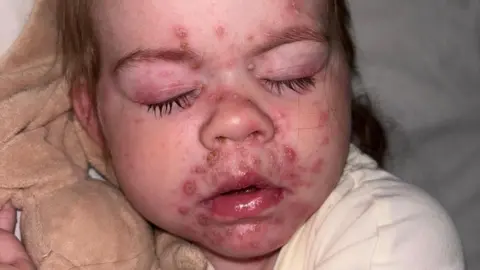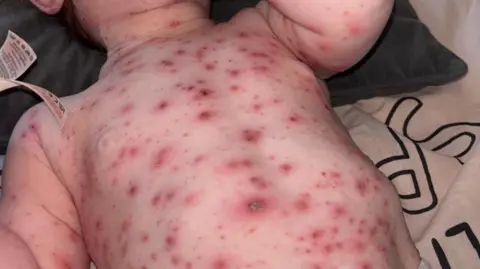Michelle RobertsDigital health editor, BBC News and
Aoife WalshBBC News
 Getty Images
Getty ImagesAll young children in the UK will be offered a free chickenpox vaccine by the NHS from January next year.
It will be given as two doses, at 12 and 18 months of age, combined with the existing MMR jab which protects against measles, mumps and rubella.
A catch up campaign is planned for slightly older children so they don’t miss out.
Until now, parents who wanted to protect their child against the chickenpox varicella virus, which causes red itchy spots, have usually had to pay up to £200 privately.
Ministers hope offering the vaccine free will not only protect youngsters from the severe, although rare, complications of chickenpox, but also save parents taking time off work to look after a sick child.
According to the Department of Health and Social Care, chickenpox causes an estimated £24m in lost income and productivity every year in the UK.
Health minister Stephen Kinnock said: “We’re giving parents the power to protect their children.
“This vaccine puts children’s health first and gives working families the support they deserve.”
The announcement comes as new data revealed none of the main childhood vaccines in England reached the 95% uptake target in 2024/25.
Some 91.9% of five-year-olds had received one dose of the MMR vaccine, unchanged from 2023/24 and the lowest level since 2010/11, according to the UKHSA.
‘Life saver’ vaccine
Chickenpox is generally mild but can be very severe for some people. Pregnant women are particularly at risk as it can cause complications for both the mother and her baby.
Very young infants and adults are also more likely to experience serious illness compared to children.
In rare cases it can cause a swelling of the brain, called encephalitis, an inflammation of the lungs, called pneumonitis, and stroke, which can result in hospitalisation and, in very rare cases, death.
The Joint Committee on Vaccination and Immunisation (JCVI), which advises UK health departments, recommended the introduction of the vaccine on the NHS in November 2023.
Experts say vaccination will dramatically reduce the number of chickenpox cases overall, leading to far fewer of the more serious ones.
Dr Gayatri Amirthalingam, deputy director of immunisation at the UK Health Security Agency (UKHSA), said vaccination could be “a life saver” for some.
Prof Adam Finn, a paediatrician who was a member of the JCVI, said chickenpox is a “rotten illness” that is often thought of as “trivial”.
The vaccine means chickenpox “is going to be a thing of the past in the near future”, he said.
The UK has lagged behind other countries in offering the jab, Prof Finn said, including the US, where it was introduced first in the 1990s.
He said the main reason for this was because chickenpox “lurks around in your body for the rest of your life” and can later come back as varicella zoster virus (VZV) or shingles. Health experts feared that if chickenpox stopped circulating, “people wouldn’t be re-exposed to the virus, their immunity would wane away and we would see more shingles”.
“Finally, we’ve now realised that concern is much, much smaller – it’s almost non-existent,” he added.
 Sarah (Mia’s mum)
Sarah (Mia’s mum)Sarah, who is a mother of two girls, says the vaccine would have helped her young daughters Willow and Mia.
Last year they both needed hospital treatment to recover from severe chickenpox.
Her youngest, Mia, developed spots “head to toe” and had a skin infection, which made her very unwell.
“She was just completely out of it…floppy.
“It was just an awful situation to be in.
“It was absolutely terrifying.”
She said she would advise parents to consider getting the vaccine: “I would never want any child or any parent to go through what we’ve been through.”
 Sarah
SarahA shingles vaccine is also available on the NHS for all adults turning 65, those aged 70 to 79 and those aged 50 and over with a severely weakened immune system.
People cannot catch shingles from someone with chickenpox. But they can catch chickenpox from someone with shingles if they have not had chickenpox before.
It is possible but very unusual to get chickenpox more than once.
Speaking about Thursday’s data on vaccinations, Kinnock told the BBC the government was concerned about uptake and vaccine hesitancy, which he said increased after the Covid pandemic.
National and local campaigns explaining “the benefits of getting vaccinated and the fact that this is 100% safe” will be brought forward, he said.
He said the government was also committed to combatting disinformation and conspiracy theories about vaccines on social media.
“It’s our job as the government, and everybody else out there that is on the side of common sense and reason, to make this case and to win this battle against the conspiracy theorists, and misinformers and disinformers out there who need to be dealt with and need to be silenced,” Kinnock added.



